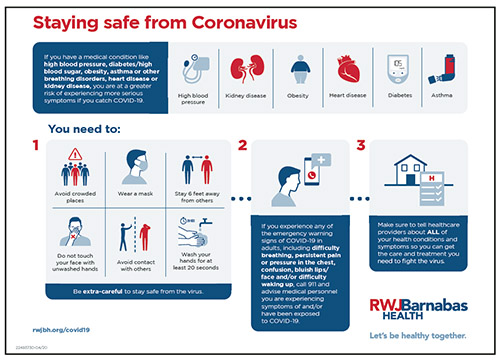
1. Can you provide a quick update on COVID-19 cases at Saint Barnabas Medical Center and how things have been going the last week or two and where they are heading within your hospital?
At Saint Barnabas Medical Center, we hit our peak around mid-April. We continue to see declines in COVID-19 admissions and our patients are going home. We had over 600 discharges as of May 1. There is still a lot of COVID-19 disease in the community and we must still maintain strict social distancing along with good hand hygiene to minimize the spread.
At Saint Barnabas Medical Center, we are taking extra precautions around cleanliness and sterilization to protect our patients and their families including creating separate areas for individuals experiencing other medical issues besides COVID-19. If you or a loved one is experiencing symptoms of a heart attack or stroke, seek immediate care and call 911.
2. If we have had COVID-19, when do we know when we are cleared to go out again?
Every day, we are learning more and more about this virus and how it interacts in the body. There is some evidence that some patients continue to shed virus even after symptoms have resolved so individuals should exercise caution and continue to wear a mask, make sure to social distance and clean their hands often. Clean and disinfect high-touch areas within your house such as bathrooms, doorknobs, light switches, refrigerator handles and faucets. The current NJDOH recommendations for leaving your home after being sick with COVID-19 are as follows:
• If there is no fever for at least 72 hours (that is three full days of no fever) without the use of medicine that reduces fevers and
• Other symptoms—especially cough—have completely resolved and
• At least seven days have passed since symptoms first appeared
Then, you are able to leave quarantine. We still recommend that you continue to wear a mask for all social and business interactions, and practice strict handwashing to protect you and your family.
3. What are the lingering symptoms of COVID-19 in mild cases, and how long do those generally last?
Some of the lingering symptoms are cough and fatigue. As long as someone is symptomatic, they should consider themselves infectious—that they can transmit COVID-19—and should continue to self-isolate even if the symptoms are mild. Depending on the individual, the symptoms can last from days to weeks. It is very important to the health and well-being of the individual’s family and the community that they continue to remain in quarantine throughout the entire course of the illness.
4. Have many of us have been infected with COVID-19 without having been tested?
At this time, there is so much we do not know about COVID-19. There is limited information about individuals with prior COVID-19 infection and the development of subsequent immunity. Clinical studies are underway to determine the proportion of the population that has been infected and if prior infection results in immunity going forward.
5. What can be done early on to prevent cases from requiring hospitalization?
It is important to recognize the risk factors for hospitalization for COVID-19 infection. These risk factors include obesity, age greater than 65, diabetes, asthma, chronic lung disease, kidney disease, liver disease, serious heart conditions and being immunocompromised. Individuals should seek immediate medical treatment with their physician if they develop any symptoms of COVID-19 infection and have one or more of the above risk factors.
Lincoln P. Miller, MD, is section chief of infectious disease, RWJ Barnabas Health and Saint Barnabas Medical Center. For more resources and information about COVID-19, go to rwjbh.org/sbmc and click on the COVID-19 banner at the top of the page.













